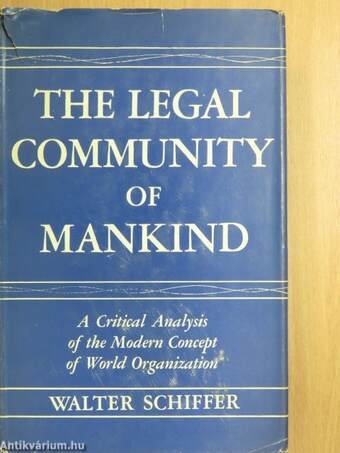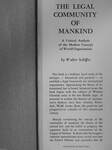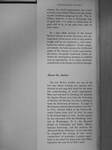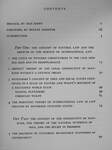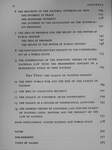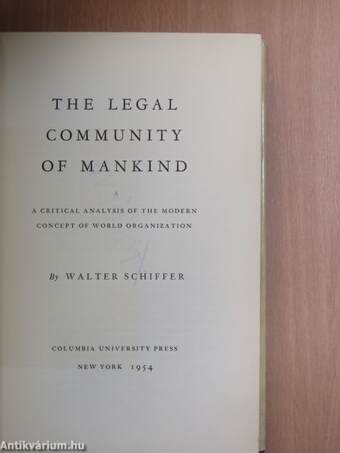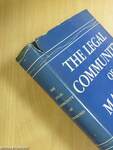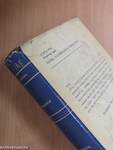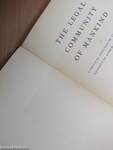1.066.456
kiadvánnyal nyújtjuk Magyarország legnagyobb antikvár könyv-kínálatát

VISSZA
A TETEJÉRE
JAVASLATOKÉszre-
vételek
The legal community of mankind
A critical analysis of the modern concept of world organization
| Kiadó: | Columbia University Press |
|---|---|
| Kiadás helye: | New York |
| Kiadás éve: | |
| Kötés típusa: | Fűzött keménykötés |
| Oldalszám: | 377 oldal |
| Sorozatcím: | |
| Kötetszám: | |
| Nyelv: | Angol |
| Méret: | 23 cm x 15 cm |
| ISBN: | |
naponta értesítjük a beérkező friss
kiadványokról
naponta értesítjük a beérkező friss
kiadványokról
Fülszöveg
THE LEGAL COMMUNITY OF MANKIND
A Critical Analysis of the Modern Concept of World Organization
by Waltwr Schiffer
This book is a brilliant, lucid study of the attempts — theoretical and practical ¦— to establish a legal framework for international organization. Approaching the theory of international law in broad, historical terms, the book begins with the collapse of Western Christian unity in the late Middle Ages. It proceeds to analyze the theories of represen-tative thinkers since then: Grotius, Pufen-dorf, Wolff, Locke, Kant, the positivist and progressivist schools of the nineteenth century.
Sharply scrutinizing the concept of the community of mankind, the theory of the natural law, and the belief in progress, the argument leads to an examination of the League of Nations. It shows that the League's inherent contradictions were carried over into the United Nations and concludes that all
(Continued on back flap)
(Continued from front flap)
schemes for world... Tovább
Fülszöveg
THE LEGAL COMMUNITY OF MANKIND
A Critical Analysis of the Modern Concept of World Organization
by Waltwr Schiffer
This book is a brilliant, lucid study of the attempts — theoretical and practical ¦— to establish a legal framework for international organization. Approaching the theory of international law in broad, historical terms, the book begins with the collapse of Western Christian unity in the late Middle Ages. It proceeds to analyze the theories of represen-tative thinkers since then: Grotius, Pufen-dorf, Wolff, Locke, Kant, the positivist and progressivist schools of the nineteenth century.
Sharply scrutinizing the concept of the community of mankind, the theory of the natural law, and the belief in progress, the argument leads to an examination of the League of Nations. It shows that the League's inherent contradictions were carried over into the United Nations and concludes that all
(Continued on back flap)
(Continued from front flap)
schemes for world organizations have tried to create a new world without basically chang-ing the conditions plaguing the old. The in-tention, however, is not to discourage men of good will: it is rather to induce men of good will to be, at the same time, men of clear vision.
At a time when revision of the United Nations Charter is under discussion, this dis-tinguished critical survey with its truly modern insight will be an important, a vitai contri-bution for realistic judgment. Clearly, simply, and soberly, the book presents the intellectual origin of the concept of world organization, the entire conceptual framework which un-derlies all contemporary attempts to establish such an organization. It is a major systematic contribution to the history of political thought.
About the Author
The late Walter Schiffer was one of the few men whose training and capacity were devoted to and especially fitted for the study and understanding of world organization. Born and educated in Germany, he obtained the degrees Doctor juris from the University of Breslau and Docteur és sciences politiques from the University of Geneva. A judge in the Germán judicial administration from 1927 to 1933, research fellow at the Geneva Research Center from 1937 to 1941, he came to the United States in 1941. In this country he was associated with the Brookings Insti-tute in Washington, D. C., the Maxwell School of Citizenship and Public Affairs, Syracuse University, and the Institute for Advanced Study, Princeton. It was here that he completed the writing of the legal community of mankind, a project upper-most in his mind for many years and which represents the sum of his life's work. Vissza



